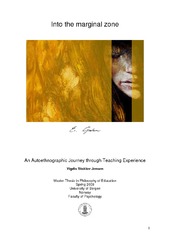| dc.contributor.author | Jensen, Vigdis Stokker | |
| dc.date.accessioned | 2016-07-26T11:48:50Z | |
| dc.date.available | 2016-07-26T11:48:50Z | |
| dc.date.issued | 2009-06-08 | |
| dc.identifier.uri | https://hdl.handle.net/1956/12324 | |
| dc.description.abstract | This autoethnographic study explores how potentials of learning and new hope emerge in decisive events where a teacher and marginalized students in Norwegian upper secondary school are involved. The events are based on my own teaching experience, and are brought into the study as four narratives. These narratives are analyzed by means of the concept of chronotope (timespace) developed by the Russian philosopher M. M. Bakhtin. His philosophy of time, space, the act and dialogicality provides the theoretical backdrop of the study, and has been used to discuss the findings. The Norwegian Government's white paper on education and social equalisation provides an educational context, and is discussed with the findings and the theoretical perspective. The aim of the study has been to investigate what knowledge of importance for the way we approach marginalized students that can be drawn from the narrated events and the methods used to analyze them. The philosophical question of what it means to be human in educational settings and context is not part of the aims of the study, but is a perspective on which the study rests. The findings of this study are the identification of four new chronotopes, where the chronotope of relation could be said to be the more important among the four. The study promotes the relation as basic for creating change in challenging educational situations, and in particular for changing the life story of marginalized students. More importantly, the knowledge of how to initiate, develop and maintain a relationship is found to be of such crucial importance for the students to manage well in society that it has to be a main educational aim together with basic skills and other types of knowledge. The study sums up with the development of a concept of chronotopical thinking, which is an embodied and relational way of thinking. The study points to further perspectives for education and educational research as a consequence of the findings. Chronotopical thinking could be a new and fruitful approach in teaching and learning. The concept also calls for further research, with regards to its difference to cognitive and analytical forms of rationality. The study sums up with a challenge for policymakers to acknowledge the view that humans are relational, and make this a reality in further policy planning. | en_US |
| dc.description.abstract | Denne autoetnografiske studien utforsker hvordan potensial for læring og nytt håp kan oppstå i avgjørende hendelser der en lærer og marginaliserte elever i norsk videregående skole er involvert. Hendelsene er basert på min egen lærererfaring, og bringes inn i denne studien som fire fortellinger. Disse fortellingene er analysert ved hjelp av kronotop-begrepet som ble utviklet av den russiske filosofen M. M. Bakhtin. Hans filosofi om tid, rom, handling og dialogisitet utgjør studiens teoretiske bakteppe, og har blitt brukt i diskusjonen av studiens funn. Den norske regjerings ”white paper” om utdanning og sosial utjevning har blitt brakt inn i studien som en utdanningskontekst, og den blir diskutert sammen med funnene og det teoretiske perspektivet. Målene med studien har vært å undersøke ha slags kunnskap som er viktig for måten vi forholder oss til marginaliserte elever på. Denne kunnskapen har blitt hentet ut av fortellingene gjennom analysen av dem. Et annet perspektiv, som likevel ikke utgjør noe mål for studien, men heller danner basis for tenkningen i den, er det filosofiske spørsmålet om hva det vil si å være menneske i utdanningssituasjoner og deres kontekst. Funnene i studien er identifikasjonen av fire nye kronotoper, der relasjonskronotopen kan sies å være den viktigste. Studien fremholder relasjon som et grunnlag for endring i utfordrende situasjoner, og spesielt med tanke på endring i marginaliserte elevers livsfortellinger. Men et viktigere poeng er at kunnskapen om hvordan en kan innlede, bevare og utvikle en god relasjon er så avgjørende viktig for hvordan marginaliserte elever skal klare seg videre i samfunnet, at den ikke kan sees atskilt fra andre utdanningsmål. Studien oppsummeres ved utviklingen av et nytt begrep; kronotopisk tenkning, som er en kroppsliggjort og relasjonell tenkemåte. Studien peker mot videre perspektiver for utdannning og utdanningsforskning som en konsekvens av disse funnene. Kronotopisk tenkning kan være en ny og fruktbar tilnærming til undervisning og læring. Begrepet påkaller vider forskning, spesielt med tanke på å utforske forskjellene mellom kronotopisk tenkning og kognitiv, analytisk rasjonalitet. Studien oppsummeres med en utfordring til policymakers, om å anerkjenne synet på mennesket som relasjonelt, og ta dette med i videre utdanningsplanlegging. | en_US |
| dc.format.extent | 444115 bytes | en_US |
| dc.format.extent | 444115 bytes | en_US |
| dc.language.iso | eng | eng |
| dc.publisher | The University of Bergen | eng |
| dc.subject | Teaching Experience | eng |
| dc.subject | Narrativity | eng |
| dc.subject | Chronotope | eng |
| dc.subject | Chronotopical thinking | eng |
| dc.subject | Embodiment | eng |
| dc.subject | Human relations | eng |
| dc.title | Into the Marginal Zone. An Autoethnographic Journey through Teaching Experience | eng |
| dc.type | Master thesis | |
| dc.date.updated | 2016-07-26T11:38:31Z | |
| dc.rights.holder | Copyright the author. All rights reserved | eng |
| dc.description.localcode | PED395 | |
| dc.description.localcode | MAPS-PED | |
| dc.identifier.cristin | 1369029 | |
| dc.subject.nsi | VDP::Samfunnsvitenskap: 200::Pedagogiske fag: 280 | |
| fs.subjectcode | PED395 | |
